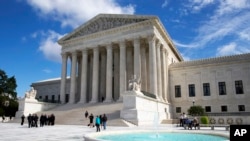The U.S. Supreme Court has taken up the sensitive question of whether Iran has to pay nearly $2 billion in compensation to the families of victims of what the U.S. sees as Iranian-backed terrorist attacks.
Among the families are the relatives of the 241 U.S. soldiers, sailors and Marines killed in an October 1983 suicide attack on the military barracks in Beirut. The U.S. determined that the Iranian-backed terrorist group Hezbollah was responsible.
Lawyers from both sides presented their arguments before the court Wednesday.
The Iranian central bank, which would have to pay out the funds, petitioned the high court to take up the case. The U.S. Congress passed a law in 2014 specifying that frozen Iranian assets in the U.S - including funds handled by second parties that do business in the U.S. - be turned over to the terror victims suing Iran.
Central bank lawyers argue that Congress violated the constitutional separation of the three branches of the U.S. government - judicial, legislative and executive - by directly intervening in a legal case.
Lawyers for the victims' families say Congress was within its constitutional limits.
Lower courts have upheld the families' right to compensation.
It is unclear when the high court will decide the case. It comes at an extremely touchy time in U.S.-Iranian relations with the nuclear agreement about to come into force.





